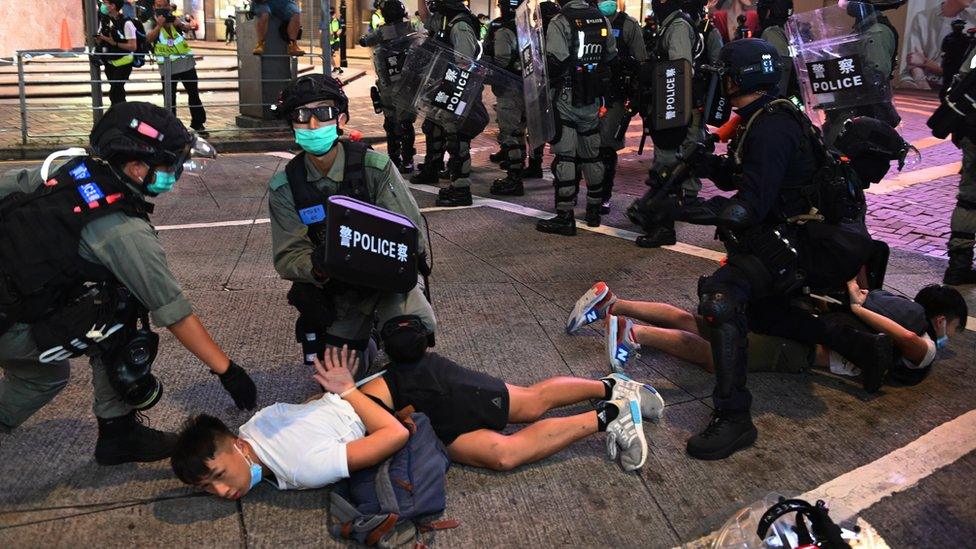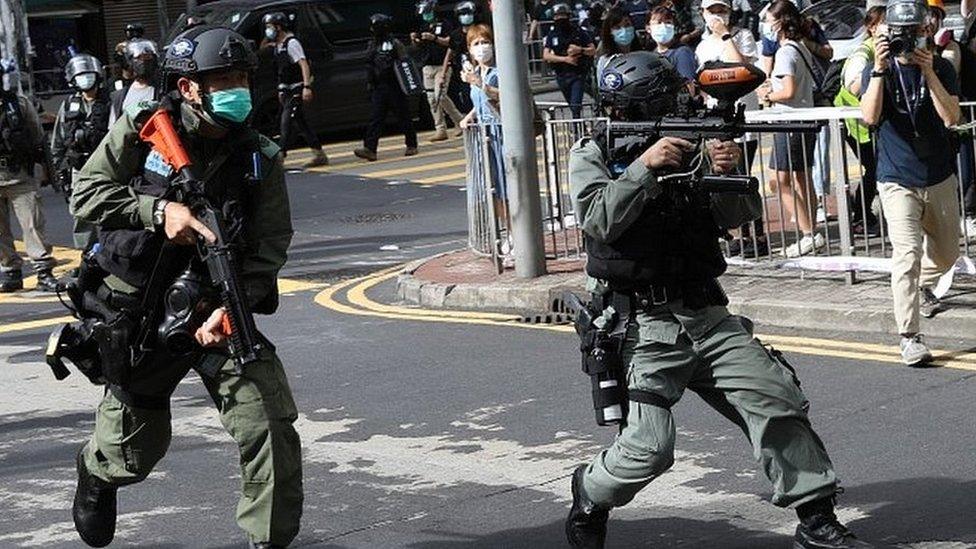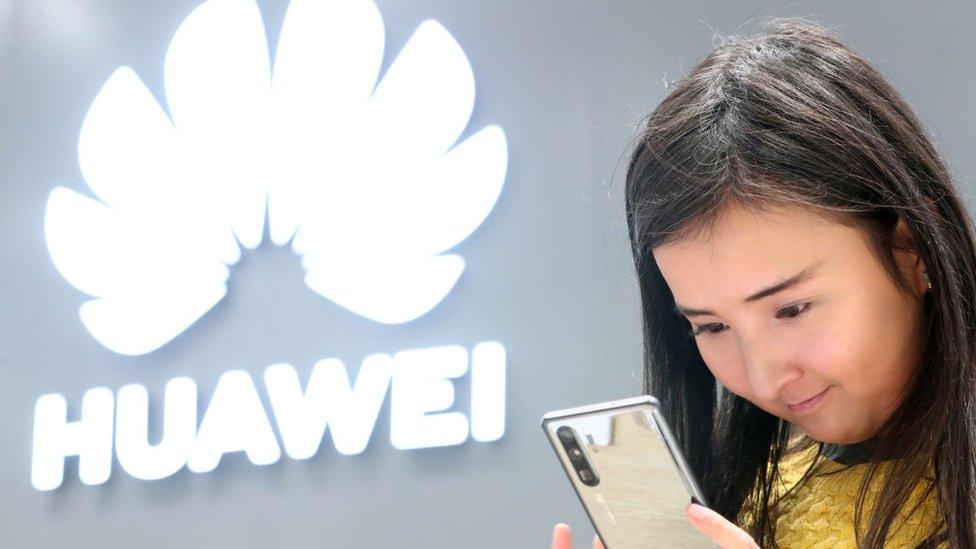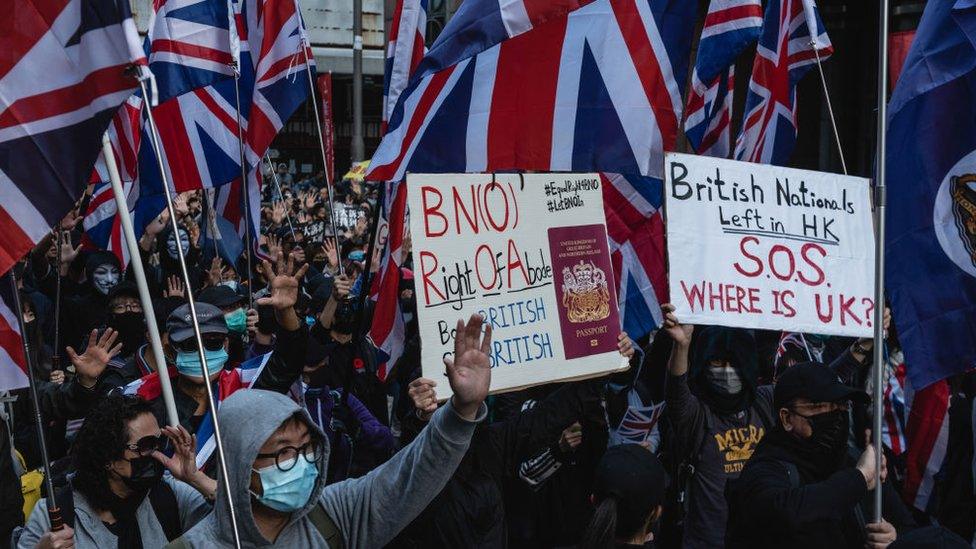UK to change extradition deal with Hong Kong - PM
- Published

Police officers detain protesters in Hong Kong during a rally against the new national security law
Boris Johnson says the UK's extradition arrangements with Hong Kong will be changed, amid rising tensions with China.
Foreign Secretary Dominic Raab is expected to suspend an extradition deal with the territory later.
It comes after Beijing imposed a controversial national security law on the ex-British colony, introducing new crimes with severe penalties.
China has accused the UK of "brutal meddling" in its affairs.
The UK has already offered residency rights and a path to UK citizenship to around three million Hong Kongers in response to the law's imposition.
Beijing has insisted it is committed to upholding international law, and has promised a "resolute response" if the UK withdraws from extradition arrangements.
The extradition treaty means that, if someone in Hong Kong is suspected of a crime in the UK, then the British authorities can ask Hong Kong to hand them over to face justice - and vice versa.
The UK fears the arrangement - which has been in place for more than 30 years - could see anyone it extradites to Hong Kong being sent on to China.
Hong Kong has extradition agreements with 19 other countries apart from the UK, including Canada and Australia, which have already suspended theirs following the imposition there of China's new security law - which makes acts of subversion punishable by life sentences.
Mr Johnson said the UK had "concerns" over the new law, and it had to think about the rights of people in Hong Kong to participate in democratic processes.
But he added: "There is a balance here. I'm not going to be pushed into a position of becoming a knee-jerk Sinophobe on every issue, somebody who is automatically anti-China".
"We've got to have a calibrated approach. We're going to be tough on some things, but we're going to continue to engage."
Special status
The UK handed Hong Kong back to China in 1997 but, as part of an agreement signed at the time, it enjoys some freedoms not seen in the mainland.
But political and economic relations between the UK and China have become strained in recent months.
Earlier this month, the UK decided to ban Chinese tech firm Huawei from its 5G network, citing security concerns denied by the company.
The UK, US and EU have accused Beijing of undermining the "One Country, Two Systems" principle, which has guaranteed a high degree of autonomy for Hong Kong since it was handed back to Chinese rule in 1997.
They say the security laws which came into force last month breach the terms of the 1984 Joint Declaration, external protecting political and economic freedoms - which agreed the conditions under which Hong Kong would be run when Britain gave it back to China in 1997.
Tea, drugs and war: Hong Kong's British history explained
The UK denounced the new laws as "deeply troubling", with the foreign secretary calling the move "a grave step".
In response, the UK has offered the 350,000 Hong Kong residents who hold British Overseas National passports - and a further 2.6 million who are eligible for them - enhanced residency rights should they wish to come to the UK and a route to possible citizenship.
But China has warned it will retaliate if the UK imposes sanctions on any of its leading officials in relation to human rights offences and allegations of police brutality in Hong Kong.
Proposals for an extradition treaty between Hong Kong and mainland China provoked widespread protests last year amid concerns about political interference in the Chinese judicial system and the right to a fair trial.

What's behind this latest move?
Analysis by James Robbins, BBC Diplomatic Correspondent
Suspending extradition to Hong Kong is a very obvious step to take.
Even if the treaty remained fully in place, it would be hard to imagine the circumstances in which the UK would now agree to hand over any suspect to the Hong Kong authorities for trial - knowing they might end up in a Chinese mainland court, and then a prison far from Hong Kong.
British suspension of the treaty - rather than outright abandonment - is quite normal.
Diplomatically, it allows China a way back, however unlikely it is there will be any retreat by Beijing.
The UK does not want to be the side to initiate a trade war with China, hence the focus on justice and the rule of law.
China has already warned - in the context of Huawei as well as Hong Kong - that Chinese businesses may judge Britain an unsuitable or unreliable partner in future.
The UK won't be the one turning up the heat in that area. But further British measures against China can't be ruled out.

'Gross and egregious' abuse against Uighurs
China's ambassador Liu Xiaoming: "There is no such concentration camp in Xinjiang"
The UK has also stepped up its criticism of China's human rights record, accusing Beijing of "gross and egregious" abuses against the Uighur population in Xinjiang province.
Mr Raab told the BBC that reports of forced sterilisation and wider persecution of the Muslim group were "reminiscent of something not seen for a long time".
Labour leader Sir Keir Starmer said his party would support a change to extradition arrangements with Hong Kong, calling it a "step in the right direction".
But he called on the government to "go further" by considering immediate sanctions on Chinese officials involved in rights abuses against Uighur Muslims.
Drone footage that has been widely circulated - and authenticated by Australian security services - appears to show Uighurs being blindfolded and led to trains.
However, China's UK ambassador, Liu Xiaoming, dismissed talks of concentration camps as "fake".
On Monday Chinese Foreign Ministry spokesman Wang Wenbin said accusations of forced sterilisation of Uighurs in Xinjiang were "nothing but lies".

NOSTALGIC NOSH: Which retro foods made a comeback in lockdown?
I MAY DESTROY YOU: The groundbreaking drama making headlines in lockdown

- Published1 July 2020

- Published14 July 2020

- Published30 June 2020
